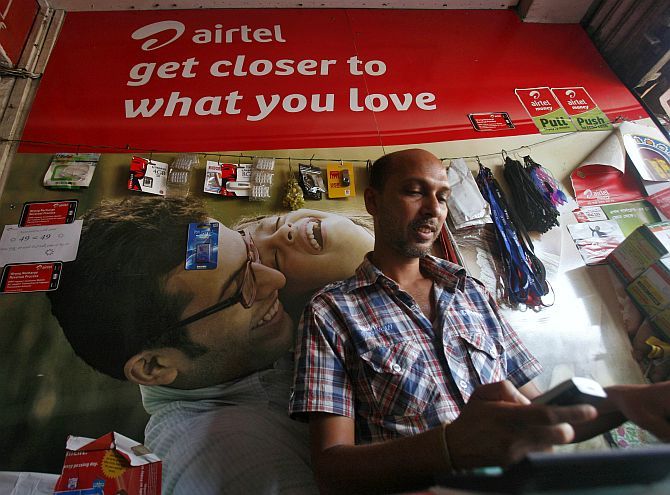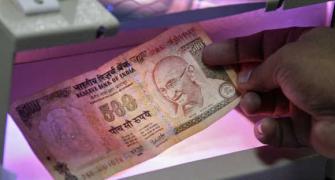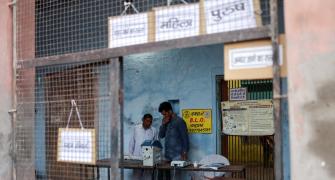The big beneficiaries of this move will be the big three -- Bharti, Vodafone and Idea.
 The telecom sector is headed for consolidation with the department of telecommunications (DoT) notifying spectrum trading norms on Tuesday.
The telecom sector is headed for consolidation with the department of telecommunications (DoT) notifying spectrum trading norms on Tuesday.
Bigger operators will be able to improve network quality by buying spectrum from smaller companies and marginal players can look at exiting by selling their spectrum.
The beneficiaries of this move will be the big three, Bharti, Vodafone and Idea, as they seek to strengthen their presence by acquiring spectrum from smaller companies.
The move will also improve the quality of service, which has deteriorated over the last few months.
Though the spectrum trading norms were cleared by the Cabinet last month, DoT notified the rules today, paving the wave for a raft of deals waiting to crystalise.
In an earlier note, Bank of America Merrill Lynch had said it expected competition to increase among the top three players as they might become aggressive in their rivals’ core circles by bridging their spectrum gaps.
“Sharing and trading norms will allow telecom companies to hold co-joined spectrum and launch new 4G conveniently. It will also allow operators to have contiguous spectrum and improve quality of service,” said Rajan Mathews, director-general, Cellular Operators’ Association of India.
Telecom operators need air waves to be bundled together for higher technologies, though non-contiguous air waves work for voice services. This will also help ease network congestion.
Spectrum can be traded in different frequencies (800 MHz (CDMA), 900 MHz (2G and 3G), 1800 MHz (2G and 4G), 2100 MHz (3G), 2300 MHz (4G) and 2500 MHz (4G).
However, only spectrum purchased in an auction or by paying the market price can be traded.
The only exception is the 800 MHz spectrum bought by Sistema Shyam Teleservices in the 2013 auction. The company will need to pay the difference in price between the 2013 and 2015 auctions.
Even before the norms were notified, telecom companies have been announcing spectrum trading plans.
Anil Ambani’s Reliance Group has it will share spectrum with brother Mukesh Ambani’s Reliance Jio for 4G services.
Jio has 2300 MHz of Long-Term Evolution (LTE) spectrum in all circles, which allows it to launch high-speed 4G data services.
It needs support of lower frequency bands such as 800 MHz in CDMA technology for voice calls. RCom is the only operator in the country to have the 800-850 MHz band in all the 22 telecom circles.
RCom is also in advanced discussions with Sistema Shyam Teleservices for acquiring the latter’s operations through a stock swap. RCom is eyeing the 850 MHz spectrum owned by Sistema Shyam, which operates with the brand name MTS, as some of its 800 MHz spectrum licences are to expire in 2021.
Videocon Telecom is discussions for spectrum trading in circles, including Haryana, Madhya Pradesh, Gujarat and Uttar Pradesh. Telenor India is also exploring spectrum sharing to expand beyond its six circles.
According to people in the know, Aircel in the 2100 MHz and 2300 MHz and Tata Teleservices in the 800 MHz bands are looking to trade their spectrum in some circles.
The guidelines released today said with the transfer of spectrum, liabilities related to spectrum like network roll-out and dues would be transferred to the company buying it.
The norms also allow telecom operators to change their frequency spot through mutual agreements and such changes will not be treated as spectrum trading.
The move will allow telecom companies to align their frequency spots and provide high-end service at a lower cost.
A transfer fee of 1 per cent of the transaction amount will be levied on the buyer. Also, a telecom operator will be allowed to trade spectrum only after two years of acquiring it.
While telecom operators will be free to decide the price at which they want to trade spectrum, the government can levy taxes and other charges based on the market price, which should not be less than the latest auction-determined price.
“If auction-determined prices are more than one year old, the prevailing market price shall be applied by indexing the last auction price at the rate of SBI’s PLR (prime lending rate),” according to the guidelines.










